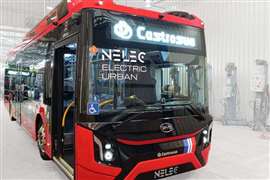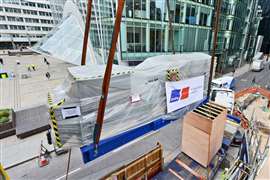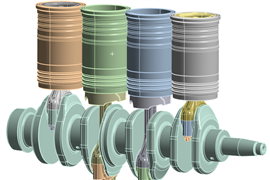Liebherr predicts zero-emissions future for internal combustion
04 October 2022
Because of the different requirements for equipment used in the off-highway segment, different solutions will be needed to reach the “countdown to zero,” said Dr. Ingo Wintruff, managing director of Liebherr’s Combustion Engine Business, in his presentation at this year’s Diesel Progress Summit in Rosemont, Ill. The company foresees a multi-pronged path to zero-emission powertrains.
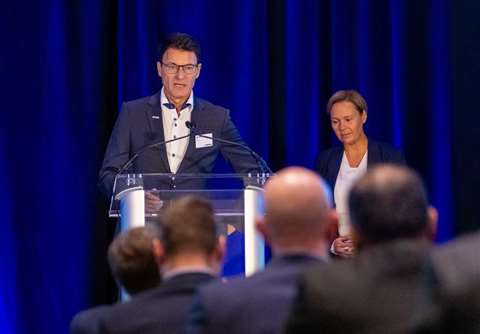 Dr. Ingo Wintruff (left), managing director of Liebherr’s Combustion Engine Business, and Stephanie Gerhardt, managing director of Liebherr’s fuel injection business, speaking at the 2022 Diesel Progress Summit. (Photo: KHL/Joe Mather)
Dr. Ingo Wintruff (left), managing director of Liebherr’s Combustion Engine Business, and Stephanie Gerhardt, managing director of Liebherr’s fuel injection business, speaking at the 2022 Diesel Progress Summit. (Photo: KHL/Joe Mather)
“We are convinced that the transformation will go into three main parts,” he said. “There is, first of all, the full electric battery drive based on renewable energy. Then we have the fuel cell, which is covered in many cases with batteries and it’s based on green hydrogen.
“And we are sure there is also in the future the internal combustion engine, which can be based on different CO2-neutral fuels.”
Each approach must be tailored to the applications and conditions in which the specific machine will operate. And while there is a limited range in which battery-electric power is favorable, there is a broad range of applications requiring higher power intensity and higher energy density that is favorable to internal combustion engines. Onboard space requirements for diesel engines and its fuel are also significantly less compared to new technologies such as fuel cells or battery-electric systems. “The difference is huge. If you try to store the same amount of energy on board, you need much more space,” said Wintruff. In addition, new technologies typically require significantly more refueling/recharging time for the same energy.
In addition, combustion engines are proven in harsh real-world conditions and applications. Most new technologies, such as fuel cells and batteries, still need to be evaluated for durability and longevity in challenging off-highway applications and environments.
“If we look at H2 (hydrogen) combustion engines, we would say this is not the same size of challenge,” Wintruff said. “Based on the very proven combustion engine technologies and on our experiences we already have today, we would say it’s mainly the operating time... and the low energy density which is the main challenge.”
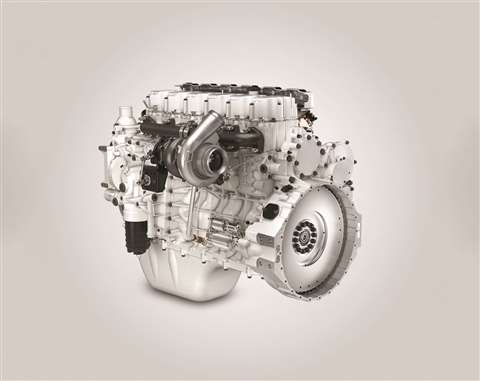 Liebherr is evaluating hydrogen and other alternatives fuels, and has already already approved HVO for its engine portfolio. Shown is the Liebherr D966 engine. (Photo: Liebher USA)
Liebherr is evaluating hydrogen and other alternatives fuels, and has already already approved HVO for its engine portfolio. Shown is the Liebherr D966 engine. (Photo: Liebher USA)
Hydrogen is just one possible solution for future combustion engine technology. Liebherr is also evaluating other fuel alternatives, including biofuels and synthetic fuels, and has already approved HVO (hydrogenated vegetable oil) for its engine portfolio. “This is the easiest and fastest way to reduce carbon dioxide emissions up to 90% already today,” said Wintruff.
Beyond the engine
Of course, there is more required to ensure a successful energy transition. Stephanie Gerhardt, managing director of Liebherr’s fuel injection business, stated zero combustion engine technology must ensure parts commonality, power density, life-cycle costs and maintenance comparable to today’s diesel engines.
“The biggest influence on this we see is the fuel injection system,” she added. “You can buy a lot of different components already nearly finished on the market, but the fuel injection system is the key technology to a good future combustion engine based on alternative fuels.”
Consequently, Liebherr is developing different variants of its fuel injection systems, including port fuel injection, since it’s still unclear what form the future combustion system will take.
Yet, ultimately, when it comes to internal combustion and zero emissions, the concern is not the engine and supporting components but the fuel that is being burned. And these fuels can be changed, said Wintruff.
“Overall, we can say that combustion engines have unbeatable advantages under harsh conditions. Combustion engines become favorable for higher energy and higher power densities. Combustion engine technology has been optimized over centuries and… the injection technology for alternative fuels, especially for hydrogen, is already available. So, [Liebherr] is convinced that combustion engines will remain a viable and essential solution to support future heavy-duty applications.”
POWER SOURCING GUIDE
The trusted reference and buyer’s guide for 83 years
The original “desktop search engine,” guiding nearly 10,000 users in more than 90 countries it is the primary reference for specifications and details on all the components that go into engine systems.
Visit Now
STAY CONNECTED




Receive the information you need when you need it through our world-leading magazines, newsletters and daily briefings.
CONNECT WITH THE TEAM











